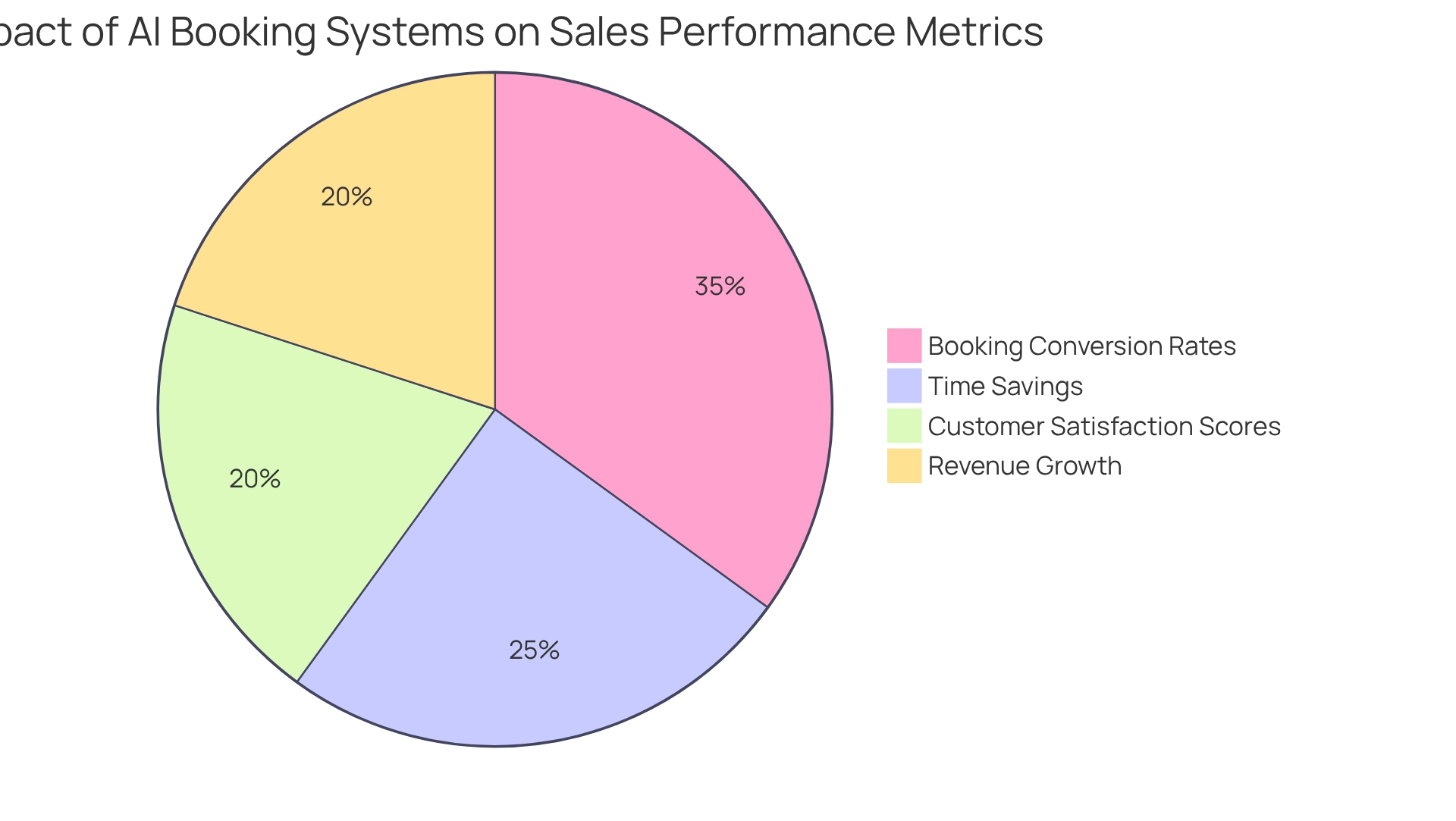
3 Strategies to Enhance Sales with AI Booking Solutions
GeneralKey Highlights:
- AI booking platforms use algorithms to optimise appointment scheduling, improving efficiency.
- Automation reduces manual scheduling time, allowing sales teams to focus on revenue-generating tasks.
- Client experience is enhanced through tailored reservation options, increasing satisfaction.
- AI booking reduces errors like double bookings by utilising real-time data.
- Data-driven insights from AI booking help customise sales strategies based on client behaviour.
- Successful implementation requires assessing current processes, choosing the right tool, training staff, integrating with existing systems, and monitoring performance.
- Key metrics to evaluate AI booking impact include booking conversion rates, time savings, customer satisfaction scores, and revenue growth.
- A case study showed a company achieved a 25% revenue increase within six months after implementing an AI booking system.
Introduction
In the rapidly evolving landscape of sales, the integration of AI booking systems is revolutionising how businesses manage appointments and enhance customer interactions. By harnessing the power of advanced algorithms and machine learning, these innovative solutions streamline scheduling, minimise errors, and provide invaluable insights into customer behaviour. As organisations strive for efficiency and improved client engagement, the benefits of AI-driven booking systems become increasingly apparent. From boosting productivity to elevating customer satisfaction, the impact of these technologies is reshaping sales workflows and driving tangible results. This article delves into the advantages of AI booking systems, practical implementation strategies, and the metrics that reveal their effectiveness in enhancing sales performance.
Understand AI Booking Systems and Their Benefits
AI booking platforms utilise advanced algorithms and machine learning to optimise the scheduling of appointments and meetings. By analysing customer preferences, availability, and historical data, these systems enhance the booking process, delivering several key benefits:
- Increased Efficiency: Automating the reservation process through AI booking significantly reduces the time spent on manual scheduling, allowing sales teams to focus on higher-value tasks that drive revenue. Agentics’ voice AI solutions further improve this efficiency by offering seamless integration with existing frameworks, ensuring a smooth transition to automated scheduling.
- Improved Client Experience: AI booking technologies provide tailored reservation options, enhancing client satisfaction and fostering stronger interactions with patrons. With Agentics’ customised voice AI solutions, businesses can create a more engaging and responsive AI booking experience for their clients.
- Reduced Errors: With minimal human intervention, AI booking platforms reduce the risk of double bookings and scheduling conflicts, ensuring smoother operations. Agentics’ technology further mitigates these risks by utilising real-time data for AI booking to manage appointments effectively.
- Data-Driven Insights: These platforms leverage AI booking to collect valuable information on client behaviour and preferences, empowering sales teams to customise their strategies efficiently. Agentics’ solutions provide practical insights that assist businesses in refining their approaches through AI booking based on client interactions.
For instance, a recent deployment of an AI reservation system led to a 30% decrease in scheduling conflicts and a 20% increase in client satisfaction scores within just the first quarter. This illustrates the tangible impact of AI booking solutions on operational efficiency and customer experience, underscoring their growing importance in the business landscape of 2025.
Implement AI Booking Solutions in Your Sales Workflow
To successfully implement AI booking solutions in your sales workflow, consider the following steps:
- Assess Current Processes: Begin by evaluating your existing reservation methods to identify inefficiencies and areas ripe for improvement.
- Choose the right AI booking tool that aligns with your business needs. Look for features such as integration capabilities, user-friendliness, and scalability. Notably, only 5% of AI use cases qualify as ‘transformational,’ highlighting the potential for significant business growth and efficiency.
- Train Your Team: Provide thorough training for your staff on how to utilise the new system effectively. This training should encompass understanding its features and interpreting the data it generates. Sales representatives must recognise that every transaction demands diligence; thus, training should emphasise this commitment.
- Integrate with Existing Systems: Ensure that the AI booking solution integrates seamlessly with your CRM and other sales tools, maintaining a cohesive workflow.
- Monitor and Optimise: After implementation, continuously monitor the system’s performance and gather user feedback to make necessary adjustments. Regularly examine data to refine your reservation strategies. Industry experts note that employing AI to automate manual tasks, such as data entry, yields favourable ROI, with 43% reporting distinct advantages.
For instance, a sales group that integrated an AI scheduling tool saw a remarkable 40% increase in appointment reservations within the first month, attributed to enhanced scheduling effectiveness. This success underscores the critical need to understand prospects’ needs and collaborate on solutions, as illustrated in the case study titled “Negotiation and Collaboration.
Evaluate the Impact of AI Booking on Sales Performance
To effectively evaluate the impact of AI booking systems on sales performance, it is essential to focus on several key metrics that demonstrate their value:
- Booking Conversion Rates: Assess the percentage of leads converting into booked appointments before and after the implementation of the AI system. This metric is crucial for understanding the direct influence of AI on lead engagement.
- Time Savings: Examine the reduction in time spent on scheduling and follow-ups. This time can be redirected towards closing deals, enhancing overall productivity.
- Customer Satisfaction Scores: Collect customer feedback about their reservation experience to assess enhancements in satisfaction levels. Higher satisfaction often correlates with increased loyalty and repeat business.
- Revenue Growth: Track overall performance metrics, including income increase and the number of agreements finalised, to assess the wider effect of AI reservation solutions on business results.
For instance, a recent case study revealed that a company achieved an impressive 25% rise in revenue within six months by utilising an AI booking system. This growth was attributed to enhanced conversion rates and improved customer engagement, effectively demonstrating the tangible benefits of AI integration. Regularly reviewing these metrics not only aids in refining strategies but also maximises the advantages of AI technology in driving sales performance.

Conclusion
The integration of AI booking systems into sales workflows is revolutionising how businesses manage appointments and enhance customer interactions. By harnessing advanced algorithms and machine learning, these systems dramatically boost efficiency, minimise errors, and deliver invaluable data-driven insights. The capacity to automate scheduling processes empowers sales teams to concentrate on high-value tasks while providing personalised experiences that elevate customer satisfaction.
Implementing these AI solutions necessitates a strategic approach, commencing with an evaluation of current processes and the selection of tools that align with business needs. Comprehensive training for the sales team and seamless integration with existing systems are essential for ensuring successful adoption. Ongoing monitoring and optimisation of the AI booking system can further amplify its effectiveness, yielding measurable improvements in appointment bookings and overall sales performance.
The positive impact of AI booking systems is evidenced by compelling metrics such as increased booking conversion rates, reduced scheduling time, and elevated customer satisfaction scores. As illustrated in various case studies, the implementation of these technologies frequently leads to substantial sales growth and enhanced operational efficiency. Embracing AI booking systems is not merely a trend; it represents a strategic initiative that empowers businesses to thrive in a competitive landscape, ultimately driving long-term success and fostering customer loyalty.
Frequently Asked Questions
What are AI booking systems?
AI booking systems are platforms that utilise advanced algorithms and machine learning to optimise the scheduling of appointments and meetings by analysing customer preferences, availability, and historical data.
What are the key benefits of using AI booking platforms?
The key benefits include increased efficiency, improved client experience, reduced errors, and data-driven insights.
How do AI booking systems increase efficiency?
AI booking systems automate the reservation process, significantly reducing the time spent on manual scheduling, which allows sales teams to focus on higher-value tasks that drive revenue.
In what way do AI booking systems improve client experience?
AI booking technologies provide tailored reservation options that enhance client satisfaction and foster stronger interactions with patrons.
How do AI booking platforms reduce errors?
By minimising human intervention, AI booking platforms reduce the risk of double bookings and scheduling conflicts, ensuring smoother operations.
What kind of insights do AI booking systems provide?
AI booking systems collect valuable information on client behaviour and preferences, empowering sales teams to customise their strategies based on this data.
Can you provide an example of the impact of AI booking systems?
A recent deployment of an AI reservation system led to a 30% decrease in scheduling conflicts and a 20% increase in client satisfaction scores within the first quarter, illustrating their impact on operational efficiency and customer experience.
Why are AI booking solutions becoming increasingly important in business?
The growing importance of AI booking solutions is underscored by their ability to enhance operational efficiency and improve customer experience, which are critical factors in the business landscape of 2025.
Enjoyed this post? Share it with your network!
10 Best AI Sales Tools to Boost Your Team’s Performance

Discover the top 10 best AI sales tools to enhance team performance and drive revenue growth.
Mastering Test Call Numbers: A Step-by-Step Guide for Sales Directors

Elevate your communication with our guide on mastering test call numbers for sales success.
7 Ways Automated Outbound Calls Boost Sales Performance

Discover how automated outbound calls enhance sales performance and streamline communication.
